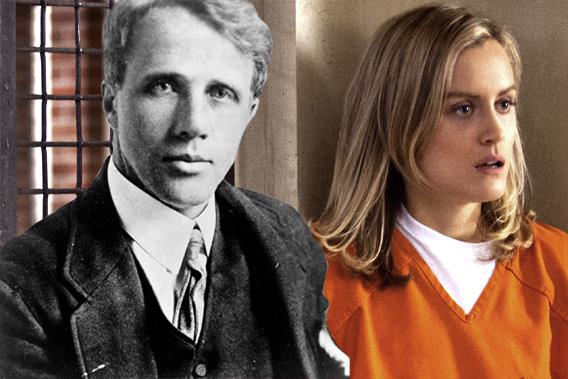In “Blood Donut,” the seventh episode of Orange Is the New Black, Taystee Jefferson (Danielle Brooks) makes a passing reference to “the road less traveled,” prompting a brief, agitated lecture from her fellow inmate, Piper Chapman (Taylor Schilling). “You know,” Piper says, “that doesn’t mean what everyone thinks it means.” “Ah shit, we’re about to get educated and shit,” Taystee replies. “No, no. I’m just saying,” Piper continues, undaunted:
everyone thinks the poem means to break away from the crowd and do your own thing, but if you read it, Frost is very clear that the two roads are exactly the same. He just chooses one at random. And then it’s only later at a dinner party when he’s talking about it that he tells everyone he chose the road less traveled by, but he’s lying. So the point of the poem is that everyone wants to look back and think that their choices matter. But in reality, shit just happens the way that it happens, and it doesn’t matter.
“I will probably kill her in her sleep tonight,” Tricia Miller (Madeleine Bewer), a third inmate, replies. “Wake me up so I can watch,” Taystee says.
Now, Tricia’s response is not entirely uncalled for, as I’ll argue below. But Piper is essentially right about the “The Road Not Taken,” which has long been one of the more misunderstood chestnuts in American poetry. In the first three stanzas, the speaker of the 1916 poem looks at one road, then another, which he calls “just as fair.” This second road, he thinks, has “perhaps the better claim,” because it appears less trodden. But he quickly corrects himself, noting that the “passing” of people to and fro “had worn them really about the same.”
In the final stanza, this speaker looks ahead to the future, and imagines how he will tell people about this day “ages and ages hence.” What he’ll say, he tells his readers, is: “I took the one less traveled by,/ And that has made all the difference.” But this is only what he’ll say. Those who have read the first three stanzas know that the roads were basically the same, and that this is merely an after-the-fact attempt to make sense out of his life.
The poem was first misread in Frost’s own lifetime, and Frost sometimes seemed proud of this fact. “I’ll bet not half a dozen people can tell you who was hit and where he was hit in my Road Not Taken,” he told the poet and editor Louis Untermeyer. The poem, he explained, was “really about his friend Edward Thomas, who when they walked together always castigated himself for not having taken another path than the one they took.” (That’s from William Pritchard’s Frost: A Literary Life Reconsidered.) In 1925, he told another reader that the poem “was my rather private jest at the expense of those who might think I would yet live to be sorry for the way I had taken in life.” Thomas, for his part, thought no one would get it: “I doubt if you can get anybody to see the fun of the thing,” he told Frost, “without showing them and advising them which kind of laugh they are to turn on.”
There’s an argument, in fact, that Frost deliberately misled many of his readers. Frank Lentricchia has said that the poem “hews closely to the requirements of popular genre writing,” and that the “strongly sententious yet ironic last stanza in effect predicts … what the poem will be sentimentally made into.” Whether or not Frost was prescient in that respect (one counterpoint would be that the sigh was intended as despairing, not triumphant), the poem certainly became a sentimental favorite. In 1978, the psychiatrist M. Scott Peck published an eventual bestseller titled The Road Less Traveled, helping to ensure that the poem’s seemingly boastful concluding phrase, rather than its more ambiguous title, would remain in the public consciousness.
More recently, the poem has been featured in terrible commercials, which hint that you should take the “road less traveled” by using their products. A little over a decade ago, Monster.com used it in a particularly prominent campaign; the rather creepy ad below becomes even more creepy when you know what Frost was really getting at.
That terrifying commercial brings me back to why Tricia is right to be annoyed by Piper and her lecture. Piper is unusual among the prisoners in Orange Is the New Black in that she comes from a well-heeled family and has a fancy college education. She’s serving one year in prison, after which she’ll have a number of choices to make about her future. It’s easy for her to say that, “in reality, shit just happens the way that it happens,” and that people’s choices don’t really matter. Her less affluent fellow inmates, whose choices frequently have grave and irreparable consequences, don’t have the luxury of such fatalism.
If you doubt that the show’s writers intended that subtext, consider Piper’s comment that the speaker of the poem is telling his story “at a dinner party.” Orange Is the New Black is very conscious of its main character’s degree of privilege—and the writers are clever enough to poke fun of it even when Piper is in the middle of being right about something (such as, for instance, a Robert Frost poem).
Previously
Does “Ozymandias” Really Mean What We Think It Means?
